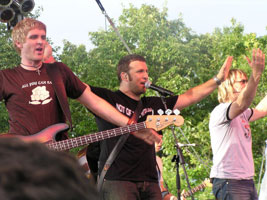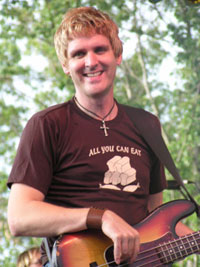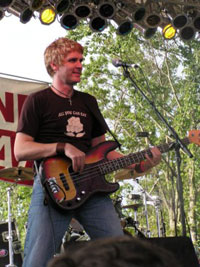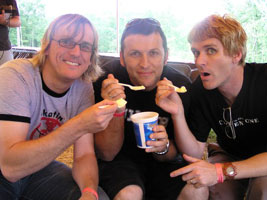| > cMusicWeb.com > Features > Paul Colman Trio Interview |
|


[ cornerstone nc | august 9, 2003
|
|
|||
|
|
|
|
|
|
THEMUSIC
|
|||
|
|
|||
|
|
|||
|
CURRENTS
|
|||
|
|
|||
|
|
|||
|
SEARCH
|
|||
|
|||
|
|
|||
|
cMUSICMAIL
|
|||
|
|||
|
|
|||
 The promotion flyer for Cornerstone, NC reads, “Come out for the bands you recognize and check out the bands you have never heard of.” Paul Colman Trio is not new to cMusicWeb. While it seems we only recently met up with them at the end of the Come Together tour in the Fall of 2002, a lot has happened in their lives since then, and a lot is to come.
The promotion flyer for Cornerstone, NC reads, “Come out for the bands you recognize and check out the bands you have never heard of.” Paul Colman Trio is not new to cMusicWeb. While it seems we only recently met up with them at the end of the Come Together tour in the Fall of 2002, a lot has happened in their lives since then, and a lot is to come.cMW: A lot has happened since we last met. A Grammy nomination, Dove Award. Can you share with us any experiences from those events?
Grant: Well I had actually never been to New York before. Phil and Paul had been to New York and done some shows even before the band was together. But it was a brand new experience for me, and it was also a brand new experience for us as a band. It was an incredible privilege and a wonderful time to go to New York and to see that city and to be part of something like the Grammy awards. And the Grammy awards were something totally unexpected to us. Paul is quite a visionary sort of guy and he looks forward and he projects goals and things for the band that perhaps Phil and I would not really specifically think about. We know that we went ahead in that general direction, but Paul set sort of flags for us to meet. Interestingly, winning the Dove award for Best New Artist was one of those flags that Paul had put down in front of us, one of the things that we really wanted to strive for. But the Grammy nomination was something that we just had no idea. We did not even really know it was on.
Phil: That our music would be classed in any particular category. So it was a real thrill to be nominated because that means that somebody has really listened to it and thought it worthy on an artistic level. Because it is Christian music, gospel music, on a lyrical content, at the same point as well. Obviously they thought it was worthy of a nomination. And of course Jars of Clay won which is totally worthy because their album The Eleventh Hour is so great. And the other cool thing was that Third Day were nominated for Rock Gospel Album and of course they won.
 It was kind of nice for us to be there to be able to cheer them on when they won! In some ways they have been big brothers to us in the industry by bringing us here, and giving us so many opportunities.
It was kind of nice for us to be there to be able to cheer them on when they won! In some ways they have been big brothers to us in the industry by bringing us here, and giving us so many opportunities.Grant: And another cool thing is that New Map of the World that was nominated has been out for over a year now, and we would like that album to reach more ears than it has because we think it is a good album, and it has a lot of good things to say and musically we think it is worth people listening to so we hope things like the Grammy nomination and the Dove award would bring the CD to more people's attention.
There are a lot of cool stories from our trip to New York. For one, Paul's dad was able to be there, and he is a Pastor in Melbourne. His dad Robert is really strong and Robert is also a singer and he had quite a career in theatre music and releasing albums. So it was nice to spend time with him. We also got to meet some people like Elvis Costello and he is a bit of a hero to us as far as signing goes.
Phil: It was also interesting being involved a little bit in the mainstream music culture. An interesting thing that happened when we arrived at the Grammys. We walked the red carpet where all the media was lined up and the cameras. Basically the deal is that they usually call the artist over, "Come on over, we want to talk with you." And no one was really interviewing us so Paul, as bold as he is, turned around and went back to the start of the line and dragged us with him. And he would walk up to them and say, "Hey.
 We are from Australia, and there are only two artists who were nominated who are from Australia, we are nobodies, would you like an interview anyway?" And most of them were kind enough to take us on for a short interview anyway. I don't think any of it turned out on television, but it was fun.
We are from Australia, and there are only two artists who were nominated who are from Australia, we are nobodies, would you like an interview anyway?" And most of them were kind enough to take us on for a short interview anyway. I don't think any of it turned out on television, but it was fun.cMW: Tell us more about your trip back to Australia and recording your upcoming album.
Grant: There is a studio in Melbourne called Sing Sing and it is a studio that as we grew up in Melbourne we'd always look to and think, "Gee, wouldn't it be great to record something there someday." And we actually tried to make that happen a few times and it never did. And bands like Crowded House, U2, and Midnight Oil have recorded there, and we have always wanted to be able to record there. It just worked out where Brent Milligan, the producer of the new project agreed to travel with his family and his wife out to Australia and let us do the basic 4 weeks of tracking for the new album there in Melbourne. We did not finish the album there, we finished it back in Nashville in between performances in the Spring. It is finished now. It is called One and we are really excited about it. It comes out September 9th.
cMW: How different is it from New Map of the World, how much is it the same? Is there a theme?
Grant: The album title, One, is the most succinct and simple and memorable way we could think of saying the theme of reconciliation. A thought that is really strong in our thoughts and in our minds and in the music of being reconciled to God and being reconciled to each other. John 17 is where Jesus is praying that just as he is one with the Father, so His followers would be one with each other and one with the Father. That vertical component of the reconciliation which is God to us, the individual.
 But also that we need to be reconciled to the people around us. And every song as we look at them throughout the album in one way or another really obviously or slightly less obviously is about this thought of being connected and being reconciled. And reconciliation is not really much of a great album title, so we thought One would be snappier.
But also that we need to be reconciled to the people around us. And every song as we look at them throughout the album in one way or another really obviously or slightly less obviously is about this thought of being connected and being reconciled. And reconciliation is not really much of a great album title, so we thought One would be snappier.Phil: I was just listening to it in the car. I think a good thing about playing music to other people, even if it is not your own album but one you like. If you play it to someone else, you are hearing it like it is the first time fresh because you are hearing it through someone else's ears. Like when you play a song that you really like to someone else. I was just playing it to a guy that has been one of the biggest supporters of me and now our music. A guy I met in Virginia when I was 18. And now playing it for him, I really enjoyed it. It sounded great. But you don't get that perspective for a while because you get your head so wrapped up into recording that you have to divorce yourself from it a little bit. And as I listened to it I thought everything sounds clean and crystal clear. I think the thing that hit me most of all is that our intention was that the production would be a bit more sparse on this album, there would be a lot more room. And that has definitely been achieved. Everything is spacious and we have got a lot more time. And it gives the melodies and the rhythm more of a chance to shine through. I think it is like reading a Frank Peretti book about a different subject and different ideas but with the same writer. I think that is what this album is like. So if you liked New Map of the World, you will definitely like this album. If you did not like New Map of the World, you will definitely like this album. We hope. What do you think, Phil?
Phil: I could not have put it better about the spaciousness. We used a lot of strings on New Map of the World. I think there are about 6 or 7 songs that have quite intricate string arrangements, almost like an orchestra sound behind a lot of them. And we have tried to go the other way with this and make it sound a little more like guitar, bass and drums. Hopefully it sounds a little more simplified. So that should let the ideas of the lyrics shine through even more so.
Grant: But I would say more simplified only to make things more able to connect with people. As Paul was writing and we were helping him finish things off, we were thinking that we want to be able to perform these songs in a very small intimate setting or to like Creation festival main stage to 50,000 people and still have them big enough, with enough gaps in between the elements, to be able to perform in the massive
 audience situation. Before we recorded One, we found ourselves on some of those stages playing in front of these massive audiences. Fine intricacies and little clever bits do not really work in that setting real well. That does not mean that it is simpleton music, it just means that it is simpler and has more impact and power and can reach further and deeper.
audience situation. Before we recorded One, we found ourselves on some of those stages playing in front of these massive audiences. Fine intricacies and little clever bits do not really work in that setting real well. That does not mean that it is simpleton music, it just means that it is simpler and has more impact and power and can reach further and deeper.cMW: Are there any musical influences from bands that you have toured with?
Paul: I don't think so. Our influences come mostly from secular music, not from Christian music, and we mostly toured with Christian bands. That is not to say that we don't like them. But I would say message wise, the album is mainly aimed toward people inside the four walls of the church. I think every single song can be understood by those outside the four walls of the church perfectly as well. But it is definitely a poignant message towards those people because if we as a church really had radical relationships that were really attractive, I don't think we would need to try so hard with events and mass evangelism to win people over. I think that the average church going person, if they were deeply inspired more in their relationships would have far more affect on the world than massive events. And so there is a message about that. But that is a message to everyone because relationships are common to everybody. So I think it is more maybe that we have been influenced by the scene that we are performing in, not so much the bands that we are performing with. I think of all the Christian music I listen to, a lot of it is directed at youth. A lot of it is really boppy and it has simplistic themes that reinforce Biblical truths. And we do that but our music is meant for all age groups and as a result I think there is some boppy teenage stuff but there is a lot of deeper themes as well. So you take a band like U2 or Coldplay or something like that....
Phil: I think in our minds we have toured with them.
Paul: You see in mainstream music you are allowed to write about everything. In Christian music, if you want to be really successful, you stick to just sort of positive upbeat music, because that is what they say on Christian radio, positive and upbeat. Whereas not everything Jesus said was positive or upbeat. So if you want to write about Jesus and his teachings, you are going to have to write about something heavy; things about the valley and not just the mountain tops.
Paul Colman Trio's aim is to write about Jesus and what he has inspired. So as a result it is not just going to be songs that are upbeat and positive. There are going to be some songs that are a real kick in the guts because that is what his teaching is about. Right next to the teaching that says, "I will be with you always," is the teaching that says, "You will be killed." Now you know the word "kill" is not probably going to get on Christian radio, but Jesus talked about it. So we are not so influenced by the music that is around us, I'd say we are more influenced by the person that influences us.
 cMW: So where do you go from here?
cMW: So where do you go from here?Paul: Well I really hope One is successful.
cMW: What is successful to you?
Paul: On a business level and then on what people refer to a ministry level. On a business level, success is selling lots of records and doing shows where people pay money to see you play. That is the measure of success in this industry. Like if you were selling mobile homes, it would be selling a lot of mobile homes in a lot of different states. Or if you were a schoolteacher, it would be doing great lesson and having the students really learn something. But the measure of success in the music industry is record sales and concert attendance's and appearance fees. So on that level we really hope it is successful.
And on the level relationship-wise and God-wise, even if one person's life is changed by it, it is already successful to a degree. So you have to separate those; you cannot necessarily put them together. The business side and the other side are very different. But I think it is important to succeed in both ways. And it is not so much how much money you have; materialism is an attitude. So we aim to be successful in all ways. That is what we want to do.
We hope that is what happens with this record. My gut feeling is that our music is not a fast burn 100 meter sprint type of music; it is more of a 3000 meters up type of music. And so in some ways career-wise we probably prefer a slow burn than a quick forest spot fire and yet we would like that slow burn to be a fast slow burn. Our music is not like instant porridge, it is more like a month long feast. It won't be one of those things that jumps out of the gates and sells 150,000 copies in the first month. But I think it will continue to sell as people grab onto it. And I think the bands that I have liked the most have been the bands that have had those sort of careers.
Phil: (answering the previous question) We are embarking on our own tour starting in the fall; between 20 and 30 shows with another artist named Sarah Kelly who was just signed with Gotee Records.
 Grant: We are super excited about this because this is our first ever headlining tour in the United States and it is an incredible thing for us. We are very excited that there are enough people around who are excited to partner with us in this. Not just our booking agent and our management, but also a lot of people across the United States who are excited to be putting on concerts for us.
Grant: We are super excited about this because this is our first ever headlining tour in the United States and it is an incredible thing for us. We are very excited that there are enough people around who are excited to partner with us in this. Not just our booking agent and our management, but also a lot of people across the United States who are excited to be putting on concerts for us.Phil: It will be interesting to see what happens in terms of attendances. In some ways it will give us some idea of the work that we have been doing; whether it is going forth and multiplying. We have done a lot of performances at a lot of summer festivals like Creation festival and large festivals around the country and had a whole bunch of people come to hear our music still for the first time even though this is our second time around doing those festivals. It will be exciting to go out in the fall and actually see how many people actually come out and see us play.
Paul: We could have gone out with another well known artist, and it was a temptation to do that, but I think all of us deep down would rather do a show where we play for an hour and a half than play for only 25 minutes. And even though there are some merits to doing this and financially we may have been better off, I think that at some point we are going to have to go and headline our own tour and take a risk. And I think it is better to do that when the expectations are lower than when they are higher. So we could go out in a year and do our own thing and if we fall flat on our faces then, it is going to be more embarrassing if we do it now. We may go out and not many people come out because our name is not big enough yet. But I think in the end it is going to be a better career move long term to go out and start to become a hot ticket event. Because in three years time we want to be pulling in 3,000 to 5,000 people per show. Paul Colman Trio's true art is at a performance. Our good art is on our record, but our truest art is in the show when we get to connect with the audience and play the songs live and talk in between and share the emotion of them. That is something we hope to do.
- Kim Flanders
September 2002
September 2002
Articles written by the staff.
Maintained by WebMaster Dan Ficker.
Site Design by da Man
All Material © 1999-2005 Different Media LLC
Support cMusicWeb.com